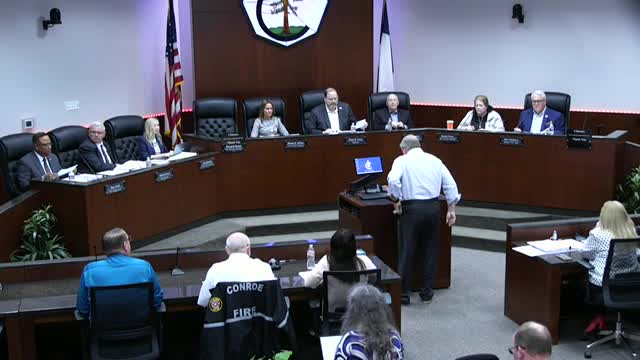Conroe council continues temporary development moratorium after heated water-supply discussion
Get AI-powered insights, summaries, and transcripts
Subscribe
Summary
The Conroe City Council voted to deny a requested waiver to the city's temporary development moratorium and to continue the moratorium while directing staff to prepare further information; residents and builders urged clarity on water capacity, interconnects and ongoing legal claims involving the San Jacinto River Authority and TCEQ.
The Conroe City Council on Thursday denied an exemption request to the city’s temporary moratorium on development and voted to continue the moratorium while directing staff to provide additional information and schedule further meetings when ready.
The action came after several residents, area stakeholders and builders urged the council to balance protecting water supplies with honoring existing contracts and development plans. Kevin Lacy, president of the Lake Conroe Association, told the council the association had reviewed “a worse case caused by a developer in terms of damages” and asked the city to support Blue Heron Bay and press the San Jacinto River Authority for infrastructure help. Lacy also said the association had presented a complaint to the Texas Commission on Environmental Quality alleging "2,500,000,000 gallons of water for flood mitigation was wasted in 2024 and falsely reported as municipal use" and estimated the loss could be worth "6 to $14,000,000 depending on the water rate."
Amy Bertrand, representing the Greater Houston Builders Association, urged the council to include builders in solutions and to base any expansion of moratorium areas on facts. "We want to be part of the conversation. We want to be part of the solution," she said.
Resident Mike Stecker pressed the council for updates on two interconnect projects he said could increase supply: an April Sound interconnect he said cost about $1.5 million and might need a roughly $300,000 pressurization system, and a physical interconnect with the City of Willis he said was negotiated in price from about $12 per 1,000 gallons down to about $5 per 1,000 gallons. Stecker also said Woodland Hills had a temporary supply plan tied to a new well in Willis that he said should supply the neighborhood within about 90 days.
City staff signaled they would bring fuller documentation back when ready. Norman McGuire (city staff) told the council that engineering letters and spreadsheets had been delivered to council earlier that morning and that staff would present the full facts when prepared. Councilmembers repeatedly requested clear, easy-to-understand slides and timelines before taking any broader or citywide action.
Why it matters: Council members described the moratorium as a high-stakes, "nuclear" option that could slow development and affect local businesses if enacted citywide without full information. Several council members said the council needs definitive data on capacity, connections and timelines to explain decisions to constituents.
Votes and formal actions: The council voted to deny a requested waiver to the temporary moratorium (motion carried) and to continue the temporary moratorium (motion carried). During discussion councilmembers proposed, and asked staff to consider, holding a special meeting to review expanded moratorium boundaries and additional technical materials once staff and the city engineer are ready.
Other routine items approved at the meeting included purchase of OpenGov software for building inspections and permitting and several contract or procurement items discussed on the consent agenda. Council deferred purchase of four police Tahoe vehicles pending review by the newly hired CFEA and deferred a memorandum of understanding with Blue Heron Bay property owners to allow staff and counsel to confirm there is no legal risk to the city.
Council direction and next steps: Councilmembers asked that staff present a scheduled update on water capacity and connection points (suggested as a recurring update), provide timelines for proposed fixes and clearly document where the city stands on interconnect options, negotiations with Willis, and any related contracts or escrow funds tied to ongoing litigation. Several members asked that the city call a special meeting on the moratorium when the staff and city engineer are ready to present the complete record.
Context and background: Speakers referenced ongoing interactions with the San Jacinto River Authority (SJRA), an active complaint filed with the Texas Commission on Environmental Quality (TCEQ) and earlier briefings the council had received. Council members emphasized that the city "inherited" the current water situation and that staff would bring data to support any future restrictive measures.
Ending: Council members said they would press staff to bring a clear presentation to the council so members can explain any actions to constituents and asked that the city avoid making decisions without the full technical record.
